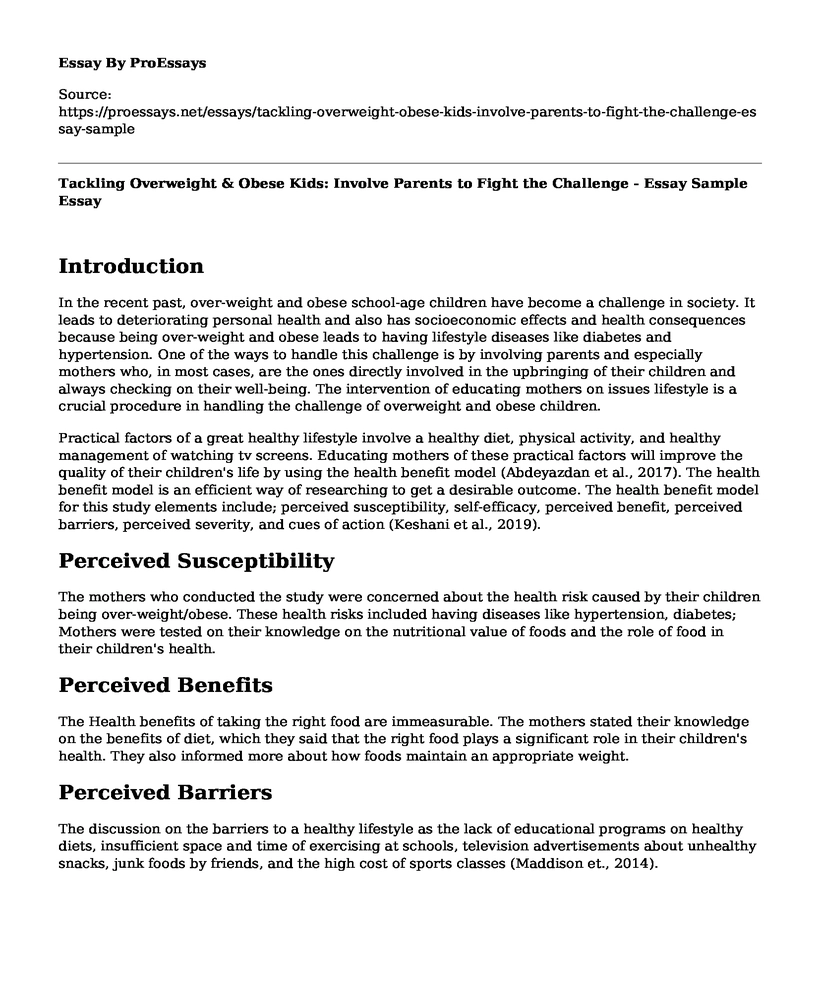Introduction
In the recent past, over-weight and obese school-age children have become a challenge in society. It leads to deteriorating personal health and also has socioeconomic effects and health consequences because being over-weight and obese leads to having lifestyle diseases like diabetes and hypertension. One of the ways to handle this challenge is by involving parents and especially mothers who, in most cases, are the ones directly involved in the upbringing of their children and always checking on their well-being. The intervention of educating mothers on issues lifestyle is a crucial procedure in handling the challenge of overweight and obese children.
Practical factors of a great healthy lifestyle involve a healthy diet, physical activity, and healthy management of watching tv screens. Educating mothers of these practical factors will improve the quality of their children's life by using the health benefit model (Abdeyazdan et al., 2017). The health benefit model is an efficient way of researching to get a desirable outcome. The health benefit model for this study elements include; perceived susceptibility, self-efficacy, perceived benefit, perceived barriers, perceived severity, and cues of action (Keshani et al., 2019).
Perceived Susceptibility
The mothers who conducted the study were concerned about the health risk caused by their children being over-weight/obese. These health risks included having diseases like hypertension, diabetes; Mothers were tested on their knowledge on the nutritional value of foods and the role of food in their children's health.
Perceived Benefits
The Health benefits of taking the right food are immeasurable. The mothers stated their knowledge on the benefits of diet, which they said that the right food plays a significant role in their children's health. They also informed more about how foods maintain an appropriate weight.
Perceived Barriers
The discussion on the barriers to a healthy lifestyle as the lack of educational programs on healthy diets, insufficient space and time of exercising at schools, television advertisements about unhealthy snacks, junk foods by friends, and the high cost of sports classes (Maddison et., 2014).
Perceived Severity
The discussion on the seriousness of being overweight and obese. These dangers are the severity of health problems like insulin resistance and the potential risk of the children carrying the disease to adulthood, which lowers the quality of life.
The four elements of the health benefit model all play an important role in effecting the purpose of educating mothers about the benefit of mother's education on matters to do with their over-weight and obese children. The knowledge of how something is beneficial will be a driving force in doing the right thing. The same applies with this study, mothers being educated and knowing the benefit of a lifestyle change will help their children in overcoming their current and future health challenges and also wipes out the fear they may be having about their children's health. Therefore, perceived benefits have become given an essential element of the health benefit model in this model.
Strengths Health Belief Model
One strength of the model is that it emphasizes a perceived value outcome and a subjective expectation that a given intervention shall bring the perceived outcome (Oriji et al., 2012).
Limitations of the Health Belief Model in Predicting Behavior Change
The health benefit model has several limitations. One of them is that the model assumes that everyone has enough information about a given disease. The other one is, it also does not take into account an individual's attitude and belief that may determine a person's decision-making process in accepting a particular behavior change. The model does not consider a person's environment and economic challenges one may encounter in receiving a behavioral change. Lastly, the model does not take into account an individual's habitual behavior which may influence one taking up a given behavioral change (LaMorte, 2019)
References
Abdeyazdan, Z., Moshgdar, H., & Golshiri, P. (2017). Evaluating the effect of lifestyle education based on health belief model for mothers of obese and overweight school-age children on obesity-related behaviors. Iranian Journal of Nursing and Midwifery Research, 22(3), 248-252. https://doi.org/10.4103/1735-9066.208163
Keshani, P., Hossein Kaveh, M., Faghih, S., & Salehi, M. (2019). Improving diet quality among adolescents, using health belief model in a collaborative learning context: a randomized field trial study. Health Education Research, 34(3), 279-288. https://doi.org/10.1093/her/cyz009
LaMorte, W. W. (2019, September 8). The health belief model. Boston University School of Public Health. https://sphweb.bumc.bu.edu/otlt/MPH-Modules/SB/BehavioralChangeTheories/BehavioralChangeTheories2.html
Maddison, R., Marsh, S., Foley, L., Epstein, L. H., Olds, T., Dewes, O., Heke, I., Carter, K., Jiang, Y., & Mhurchu, C. N. (2014). Screen-time weight-loss intervention targeting children at home (switch): a randomized controlled trial. International Journal of Behavioral Nutrition and Physical Activity, 11(1). https://doi.org/10.1186/s12966-014-0111-2
Orji, R., Vassileva, J., & Mandryk, R. (2012). Towards an effective health interventions design: An extension of the health belief model. Online Journal of Public Health Informatics, 4(3). https://doi.org/10.5210/ojphi.v4i3.4321
Cite this page
Tackling Overweight & Obese Kids: Involve Parents to Fight the Challenge - Essay Sample. (2023, May 02). Retrieved from https://proessays.net/essays/tackling-overweight-obese-kids-involve-parents-to-fight-the-challenge-essay-sample
If you are the original author of this essay and no longer wish to have it published on the ProEssays website, please click below to request its removal:
- Impact of the Artful Moments Intervention on Persons With Dementia and Their Care Partners
- Consumer Target Audience
- Contemporary Nursing and Issues Social Issues Paper Example
- Does Rap Music Promote Violence in High School? Essay
- Increasing Gun-Related Violence Essay Example
- Healing and Autonomy and Christian Worldview Paper Example
- Essay Sample on Nursing: An Underrated Yet Fulfilling Profession







